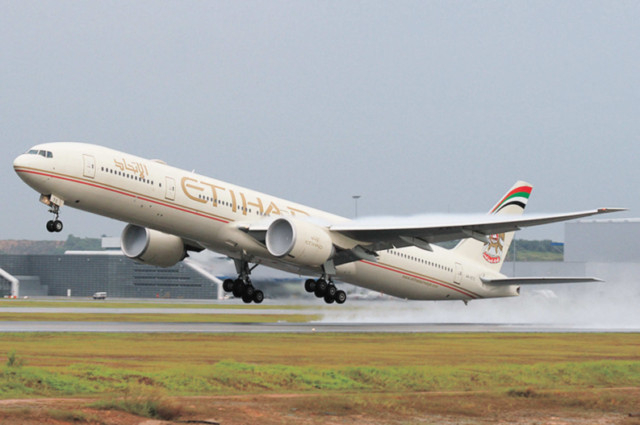Dubai: UAE carriers Emirates and Etihad Airways continue to overcome sovereign concerns as international rivals oppose their expansion into new and existing markets.
Most recently Abu Dhabi-based Etihad Airways’ bid to take a 24 per cent equity stake in Jet Airways received Indian regulatory approval after a long drawn-out deal that was first reported in April this year.
A month earlier Dubai’s Emirates airline launched new strategic and historic partnerships with Australian flagship carrier Qantas. In the deal Qantas moved its Australia-to-London “Kangaroo Route” international hub from Asia to Dubai.
While it is too early to say exactly what the Jet Airways deal means for Etihad, it is no doubt lucrative. The tie-up, which puts Etihad President and Chief Executive Officer, James Hogan on the Jet board, gives the Abu Dhabi flagship carrier access to Jet Airways’ Indian network. A windfall for any foreign airline serving the highly lucrative, Indian market.
The Emirates-Qantas tie-up it is a different story. According to Dubai Airports, the management behind Dubai International, passenger traffic out of Australasia rose 41.3 per cent in October compared to the same period last year. In September there was a 38.6 per cent increase compared to the same period in 2012. The relationship is clearly driving traffic not only through hub but into Dubai — where according to the Australian Consulate in Dubai up to 10,000 Australians now visit the UAE each week.
But it’s not all clear skies in the Australian market.
Foreign ownership
Alan Joyce, Qantas CEO, recently went public in denouncing foreign ownerships of rival airline Virgin Australia.
Government-backed foreign airlines Etihad Airways (19.9 per cent), Singapore Airlines (19.9 per cent), and Air New Zealand (22.9 per cent) all hold significant stakes in Virgin Australia and reportedly could increase their stake in a total combined capital injection of A$350 million (Dh1.2 billion).
While Joyce’s public bolstering is unlikely to have an immediate impact — he has got the attention of the Australian government and public.
But there are other markets out there.
Last month Etihad Airways announced it will be taking a 33.3 per cent stake in little known European regional airline Darwin Airlines, which will be rebranded “Etihad Regional — operated by Darwin Airlines”.
Will Horton, Senior Analyst at CAPA — Centre for Aviation said in an emailed statement to Gulf News that the broad picture for Etihad Regional is to serve small points where Gulf Carriers will never fly to, as well as feed Etihad’s other European equity partners airberlin and Air Serbia.
Regional European aviation is not known for its profits and while Darwin has weak financials, the airline reportedly increased its share capital in September 2013 from €1.6 million to €16 million, according to the Centre for Asia-Pacific Aviation (CAPA).
Different partners
In a recent op-ed in local media Hogan said “Etihad Regional is a brand that can be rolled out almost anywhere in the world, with many different partners.”
While this begs the question “who’s next?” Horton said, “What is certain is that despite Darwin being a small airline, placing the branding of Etihad Regional has put European carriers on alert now that a Gulf brand is stamped on a European airline.”
“Is this the straw that will break Europe’s back?”
UAE’s budget carriers, too, have expanded reach in 2013. Dubai-based flydubai announced 16 new routes in the year, besides increasing the frequency of several destinations across its network of 66 destinations.
Sharjah’s Air Arabia, meanwhile, added eight new airports to its route network in the year including Sialkot in Pakistan, Baghdad in Iraq, Lar and Mashhad in Iran, Yerevan in Armenia, and three Saudi routes — Abha, Hail and Hofuf.













